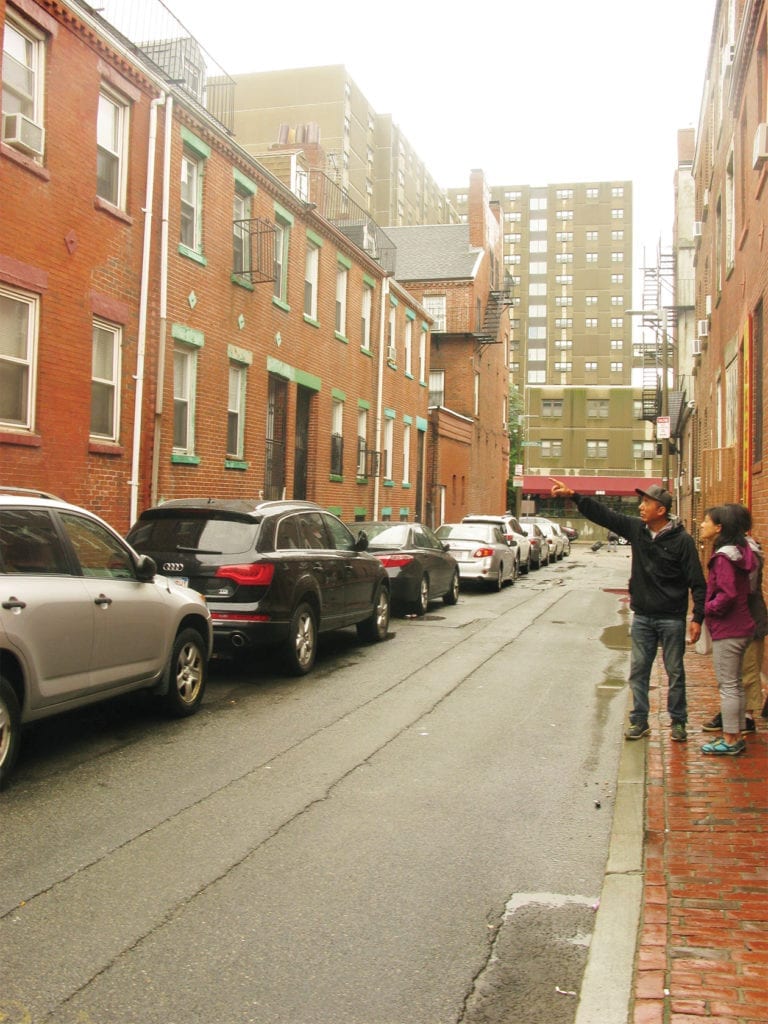Chinatown residents battle gentrification in historic row houses
Residents, nonprofit seek protections for tenants as new owners seek to maximize profits in tight-knit enclave

Shortly after buying 9 Johnny Court, the new owner plans to nearly double the small row house in size, and residents are worried about the effect this will have on their neighborhood.

John and Wendy Lee. Photos: Saphia Suarez
This row house stands amongst identical houses that line the street on both sides. All of the buildings were built in 1915 in the same 19th century style. The developer of number 9, Cai Tao, plans to nearly double the two-story building in size by adding two levels to the top and expanding the back. This will turn the two family home into a five-unit building.
Residents are concerned that this will not only impact the character of the street, but the community within the neighborhood.
Tight-knit
“Everyone in the neighborhood, we know each other,” says Wendy Lee, who lives at 7 Johnny Court with her husband John. Their house abuts number 9, and will be most affected by the renovations. “It used to be very quiet,” she continues. “We took care of each other, like a big family. Now you don’t know your neighbor.”
The planned changes on Johnny Court are emblematic of changes that have ripped at the fabric of the once-insular immigrant community in Boston’s Chinatown community. Now ringed by luxury high rise condo buildings, the row houses remain one of the last bastions of relatively affordable housing in the neighborhood.
The Lee family moved onto Johnny Court over 50 years ago. They rented one unit of the two family at number 7, and when the owners wanted to sell, they made the Lees an offer first. The owners sold it to them at an affordable price, and the Lees bought the house in 1968. Their three children grew up on that block, along with 20 other kids on the street.
Social Support
All the children played together, rode their bikes together, jumped rope, and went to school together, Wendy Lee said.
People could provide social support for each other at that time, said Karen Chen, the executive director of the Chinese Progressive Association. Chen and her organization have been helping the Lees fight back this development.
“People talk about preservation in terms of buildings, but we also need to preserve the sense of community,” she added.
The Lees had a meeting in June with Cai Tao’s lawyer, Lane Goldberg. They spoke about the Lee’s structural concerns regarding the development. They are afraid the foundation will not be able to support two more stories, and if the foundation of number 9 fails, their house will be affected. They are also concerned that the sewer will not be able to sustain the additional three units added onto number 9. Last year their sewer backed up, and the sewer pipe goes right between the two houses.
Wendy Lee said that when Goldberg asked if they had any more questions, they didn’t know what to say. The lawyer was talking in terms of structural technicalities, while their main concerns were about irreparable changes being made to their community.
Petition
To address these concerns, the Lees have put together a petition that they aim to send to the appropriate government officials and departments with the help of Chen and other CPA staff.
The petition opposes the renovations at both 9 Johnny Court and at 29 Oak St. These two historic row houses are one street apart. According to the petition, the Boston Landmarks Commission said these building survive “as a notable example of early 19th century Federal Style brick row architecture.” The developers of 29 Oak St plan to make the three-family home into four market-rate condominium units.
While the Lees are fighting this one instance of gentrification in Chinatown, the Chinese Progressive Association is fighting to pass policies that would increase the rights of all Chinatown residents. One of these policies is tenants’ first right of refusal. This would ensure tenants get the first chance to buy their homes if the owners decide to sell. If tenants do not want to buy or cannot, they could give this right to a nonprofit that aims to keep their neighborhood affordable, and the nonprofit or other organization could purchase the property before developers buy it.
This right of first refusal is similar to what the Lees were given, which allowed them to buy their house and stay in Chinatown in the ’60s. But this policy would not stop the development at 9 Johnny Place, as the property is now vacant.




